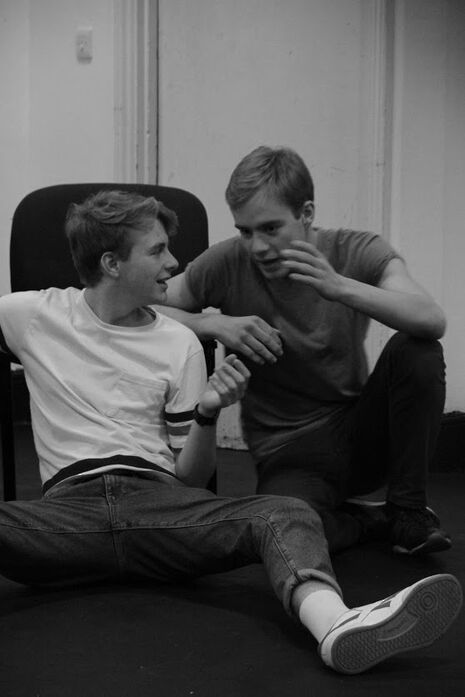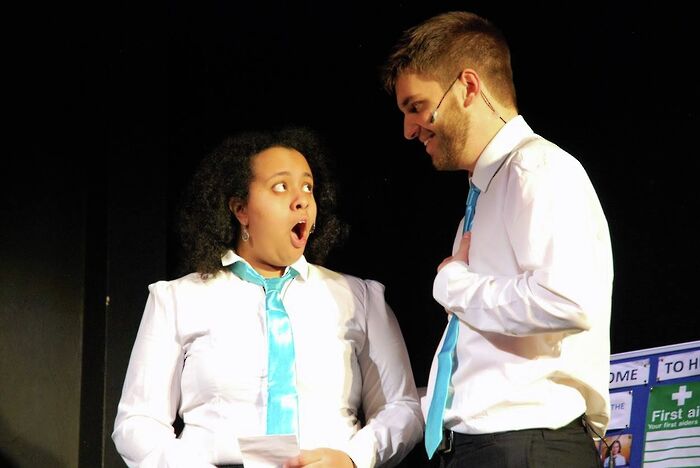Drunk Enough to Say I Love You? preview
Politics and intimacy coalesce into this chilling two-hander

Entering the Corpus Playroom in a drizzly afternoon, the rehearsal set of Drunk Enough to Say I Love You? offered an intimate refuge from the looming darkness and coldness outside - the small black box theatre was physically empty, save for a few chairs doubling up as a sofa on stage and not more than five people in the rehearsal, but it instead served as the background for the intensity and expansive desire between the two main characters, Sam and Guy, to fill the space as they go from reverie in each other’s company to bitter disillusionment from one to the other.
Drunk Enough to Say I Love You? is an allegorical play which alludes to US foreign policy through elliptical conversations between two lovers Sam and Guy, with the latter abandoning his wife and children to join Sam. Sam is set to represent the United States, while Guy is an everyday man who fell in love (and out of love eventually) with the state. Lovers’ intimacy behind closed doors and American grand strategy in the 20th century were tightly interwoven, as Director Maya Yousif puts it, the play is a “perfect embodiment of the notion that the personal is the political, and vice versa”, blurring the lines between the pair’s relationship and the United States’ relationship with the world.
Interestingly, and perhaps one of the biggest source of enjoyment when watching the play, the roles for the cast will be determined by a coin toss right before the show begins. This means that actors Toby Waterworth and Henry Eaton-Mercer will have to familiarise themselves with both characters in the play, exploring different portrayals as both of them are more compelled to explore novel interpretations in the double rehearsals. Director Maya Yousif was inspired by the same arrangement found in plays she had watched at the West End, and decided to apply this to the play as it will help provide insight into different narratives, agreeing with Toby Waterworth that this will end up creating different versions of the same play. Yousif further commented that the play “starts in a place of spontaneity [...] with a sense of uncertainty to what the future holds” with Guy leaving his wife and children, therefore the coin toss will hopefully intensify this atmosphere in the theatre.
The atmosphere in the theatre was indeed intense, though not solemn. Toby Waterworth and Henry Eaton-Mercer were both charismatic in their portrayal of Sam and Guy, with plenty of chemistry as well. Intimacy and desire shone through the room as they enliven the sparse lines, which were never complete sentences. Throughout the rehearsal, it never failed to amaze me in how natural the dialogue felt, and how potent is the emotion that radiated from the performance, when the actors are conversing in broken phrases or clauses at best. It blended well with both layers of the play - displaying the lovers’ connection in finishing each other’s sentences and interrupting each other with corresponding trains of thought, as well as the aggressive tension in one’s political ambition. Yousif told me that it was in fact due to the stark and fragmented language, coupled with the complete lack of stage directions, that attracted her to the play. To her, this is not only a welcome challenge but also gave her much freedom in directing, “I guess that’s what I found quite exciting, it’s a sort of mix of the challenge and freedom, and it’d be fun to give it a go,” Yousif explained.
“You can almost hear the Trumpisms coming out of the script.”
Apart from technical elements, Yousif also emphasised on the allegorical and political context of the play, “I think from reading the play I’ve learnt a lot about that kind of current affairs [the play is centred on], because every single allusion in the play is grounded in reality [...] although the play is fictitious, it is also real”. She continued that the theatrical format also presents another way for the audience to digest the issues presented in the play, for the audience will be “forced to sit through all the horrible things that are mentioned”, which demonstrates the facts powerfully and forges a connection that nudges the audience to reflect on the issues in a way that would not happen with news articles.
On the play’s relevance to today’s United States, both Yousif and Eaton-Mercer thought that we are currently living in the repercussions of the events mentioned in the play. Sam’s narrative in the play is certainly echoed in today’s politics, “you can almost hear the same Trumpisms coming out of the script,” Eaton-Mercer exclaimed, “what makes it more powerful is that it is not about Trump, it predates Trump by ten years, and to think that a decade down the line we are almost at a similar situation.” Guy’s final frustration with Sam’s inability what is blindingly blatant about the environment resonates with “how a lot of the world views certain US leaders”, Yousif chuckled. Although the play is allegorical, it does not shun the human side of the characters. Yousif added that the humanness of the allegorical characters and their relationship comes from the dimension of control, where Sam tried to control and coerce Guy into remaining in love with him. The flawed personalities of both Sam and Guy further render them “duplicit” to what happened to their relationship, as the Director and both actors emphasised, reinforcing the personal side of the play.
Entangling the grand political narrative and intimate romantic love, enmeshing an ordinary man’s infatuation with the grandiose state in the net of sacrifice for an affair, Drunk Enough to Say I Love You? Is an attack on American foreign policy thinly veiled under the privacy and affection between two lovers. It is a play where human dialogue is broken down to its raw core of thought and emotional exchange, wrought with the iron cold chains of relentless American foreign policy.
 News / SU stops offering student discounts8 January 2026
News / SU stops offering student discounts8 January 2026 Comment / Plastic pubs: the problem with Cambridge alehouses 5 January 2026
Comment / Plastic pubs: the problem with Cambridge alehouses 5 January 2026 News / Uni-linked firms rank among Cambridgeshire’s largest7 January 2026
News / Uni-linked firms rank among Cambridgeshire’s largest7 January 2026 News / New movement ‘Cambridge is Chopped’ launched to fight against hate crime7 January 2026
News / New movement ‘Cambridge is Chopped’ launched to fight against hate crime7 January 2026 News / Cambridge businesses concerned infrastructure delays will hurt growth5 January 2026
News / Cambridge businesses concerned infrastructure delays will hurt growth5 January 2026










